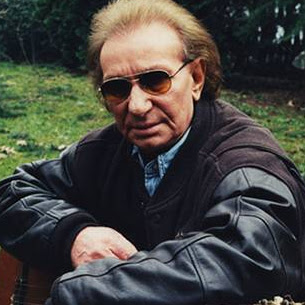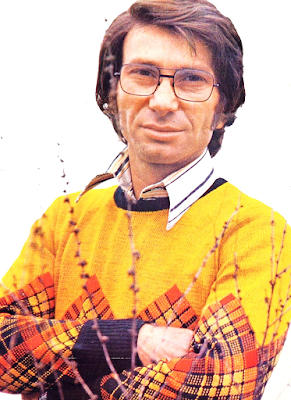Nicola Di Bari, born Michele Scommegna on 29 September 1940, is an Italian singer-songwriter and actor. He is considered one of the "sacred monsters" of Italian pop music.
Hailing from Manfredonia, a city in the Central Italian province of Foggia, in Apulia, Di Bari was born the youngest of ten children to![]() an impoverished family. In an attempt to prevent him from inheriting their peasant life, his parents sent him to the study at the Archepiscopal Institute Scared Heart of Manfredonia.
an impoverished family. In an attempt to prevent him from inheriting their peasant life, his parents sent him to the study at the Archepiscopal Institute Scared Heart of Manfredonia.
 an impoverished family. In an attempt to prevent him from inheriting their peasant life, his parents sent him to the study at the Archepiscopal Institute Scared Heart of Manfredonia.
an impoverished family. In an attempt to prevent him from inheriting their peasant life, his parents sent him to the study at the Archepiscopal Institute Scared Heart of Manfredonia. Although he possessed a natural talent as a singer, Di Bari did not sing until succumbing to friends' urging and making his debut at a festival for the patron saint, Zapponeta. Receiving such a warm response, he continued to sing at regional competitions and festivals. Moving to Milan in 1958, Di Bari was enchanted by the city's thriving music scene, spending countless hours at galleries ![]() listening to a diverse range of musicians.
listening to a diverse range of musicians.
 listening to a diverse range of musicians.
listening to a diverse range of musicians. Straight away Michele took part in a competition for new voices where the jury, impressed by his strangely different voice, gave him first prize. One of the jury members was maestro Leoni of the SAAR record company who offered him the opportunity of taking singing lessons and shortly afterwards a contract with the company. With SAAR he recorded a series of fortunate singles like “Piano, pianino”, “Amor non farmi pianger più”, “Perché te ne vai”, “Amici miei” and in the meantime he took part in the Cantagiro song contest.
 one of the best sellers.
one of the best sellers.Then came THE test, i.e the Festival of Sanremo the next year, 1965, when the SAAR took him to the contest with “Amici miei” in a duo with Gene Pitney and they arrived second. In 1970 Di Bari obtained a great commercial and critical success with the song "La prima cosa bella", which ranked second at the Sanremo Music Festival and first on the Italian hit parade.
In 1971 he won the Sanremo Music Festival and Canzonissima, with the songs "Il cuore è uno zingaro" and "Chitarra suona più piano". In 1972, he won again the Sanremo Festival and represented Italy at the Eurovision Song Contest with the song "I giorni dell'arcobaleno" ("The Days of the Rainbow"). In the following years Di Bari grew his international popularity, especially in Latin America, where he recorded several albums in Spanish and where he gradually focused his career.
 Di Bari spent much of the '80s in South America, building as strong a following there as in his native land. His many hits include "La Prima Casa Belle,""Il Cuore e Uno Zingaro,""Chitarra Suona Piu Piano,""I Giorni Dell'Arcobaleno," and "Il Mondo e Grigio Il Mondo e Blu."
Di Bari spent much of the '80s in South America, building as strong a following there as in his native land. His many hits include "La Prima Casa Belle,""Il Cuore e Uno Zingaro,""Chitarra Suona Piu Piano,""I Giorni Dell'Arcobaleno," and "Il Mondo e Grigio Il Mondo e Blu." Singing in his native Italian or in Spanish (which he considers his second language), Nicola Di Bari has been melting hearts with his romantic balladry for more than four decades. He has maintained a constant presence on Italy's pop charts.
(Info edited from Wikipedia & Craig Harris @All Music & last fm bio))

